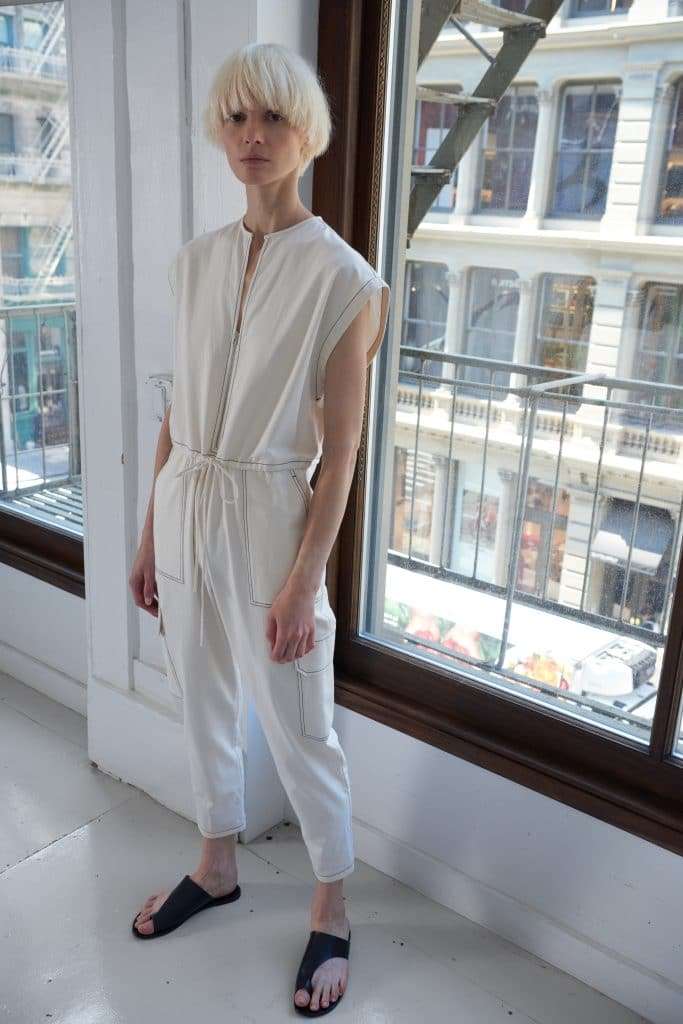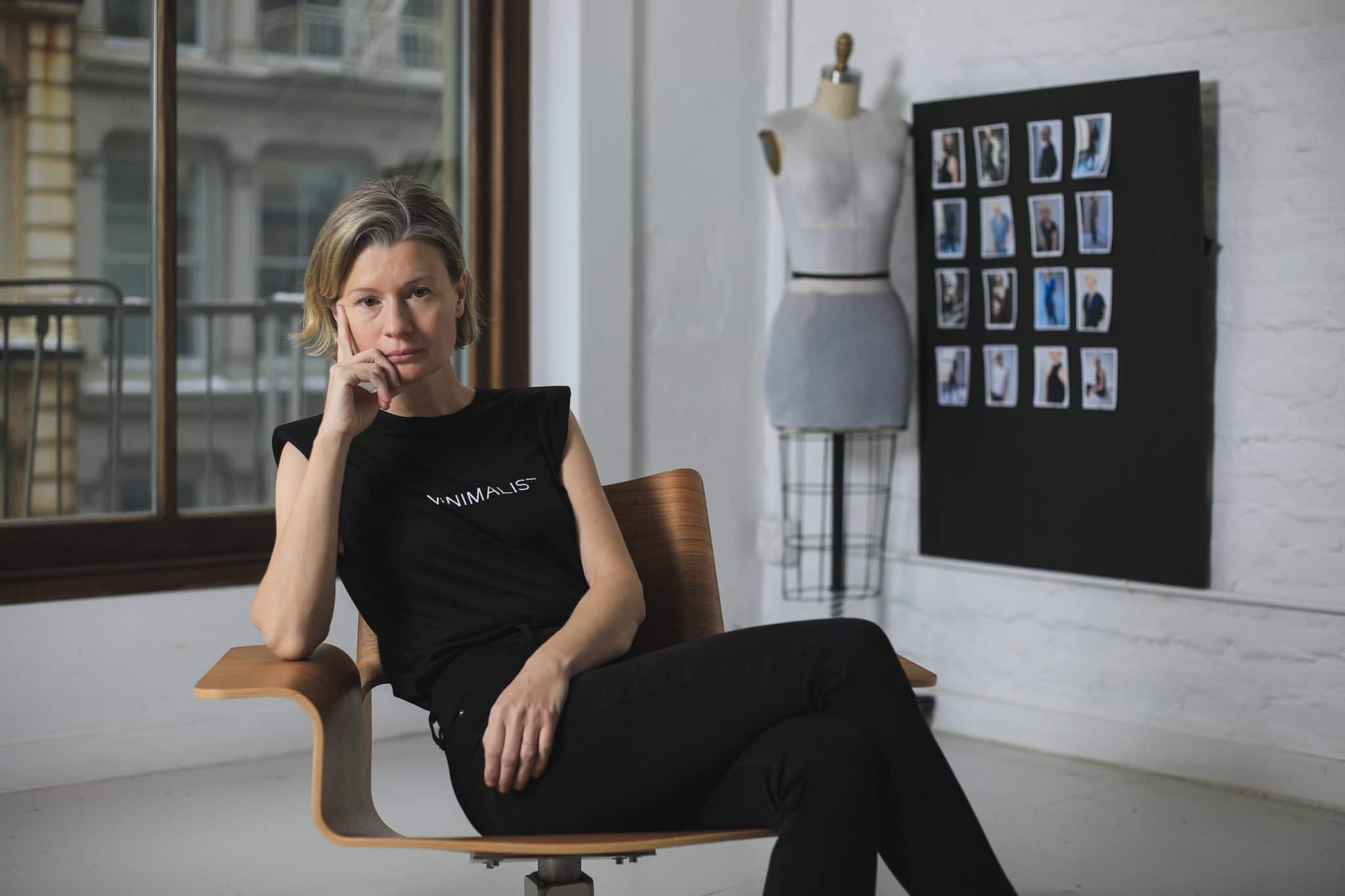As Russia’s invasion of Ukraine continues, Ukrainian-born fashion designer Tamara Davydova speaks to Ethos about her homeland, art, and how the fashion industry can help.
Tamara Davydova, fashion designer and founder of the sustainable clothing brand Minimalist, grew up in Kyiv, Ukraine. She came to the U.S. at age 15, after the fall of the Soviet Union. But she still has friends and family there.
“We still have our family home in Kyiv, where my parents live,” Davydova told Ethos via email. “Thankfully they came to New York right before the war broke out and are safe,” she says.
Davydova last visited Ukraine before the pandemic, in 2018. But Davydova says she normally visits regularly, especially to Kyiv, “the city I love, rich with culture and history.” Despite making her home in the U.S., Davydova and her husband were married at Kyiv Botanical Garden in 2007. “We were surrounded by our friends from all over the world–it was one of the best times of my life,” she says.
As the situation escalates, Davydova says she’s checking in daily with friends and family, but for some, communication has been cut off.
“We are constantly in touch with our friends and family in Kyiv, but we can’t get a hold of some of our friends for over a week in the resort town outside of Kyiv where we have a country house,” she says. “Sadly, over the past couple of weeks, the village has become a battlefield, and the fate of many friends and neighbors is unknown.”

I asked Davydova about Ukraine’s art scene—she went to art school there before attending Parson School of Design in New York City. She pointed to a quote from Rosa Lyster in a recent New York Times article about Kyiv, particularly its art scene:
“Kyiv’s underground scene has been developing a reputation for some time, to the extent that it is now regularly submitted as candidate for the position of the ‘new Berlin.’ Not everyone likes this comparison, pointing out that it is a corny thing to say and also that it diminishes the city’s individual identity, but most will broadly agree with the sentiment behind it, which is that the scene in Kyiv is now understood to be cool.“
-New York Times
Davydova says with all of the media censorship happening in Russia, scene’s like Kyiv’s once-flourishing art movement are in jeopardy if Russia succeeds in its attacks.
“With the censorship which we are witnessing in Russia right now, I have no doubt that Putin approves art and culture that benefits his regime, reminiscent of the Soviet era when most art was commissioned by the state to depict the party leaders,” Davydova says.
But as recently as a month ago, Kyiv was a thriving community “attracting artists and dealers priced out of European art capitals like Berlin,” says Nate Freeman, a Vanity Fair staff writer.
“Like that city, Kyiv’s scene has thrived in recent years alongside an all-night rave culture and sizable LGBTQ+ community—once upon a time a rarity in post-Soviet countries. The core of the historic district boasted not just the Pinchuk Art Center but a number of galleries, kunsthallen, artist-run pop-ups, and cheap studio space. It is now in the middle of a war zone where some of its artists, programmers, and work-by-day, club-by-night kids are taking up arms to defend their country,” he says.
Economic impact
Russia’s invasion of Ukraine is already being felt around the globe as gas prices rise. Ukraine is a leading exporter of grains and seeds, known as the “bread basket” of Europe. The invasion could disrupt next month’s seed planting, which would mean no crops and a devastating economic impact for the economy in Ukraine, and spiking food prices around the world.
Neighboring countries including Bulgaria and Romania are expected to feel the impact, particularly in their clothing manufacturing industries. According to Global Data, this is expected to impact retailers that source from those countries. This could lead to widespread materials shortages, transportation delays, and even a shortage of workers.

The global fashion industry has been one of the most vocal in calling for an end to the invasion and lending support. French luxury label Louis Vuitton recently donated more than €5 million to relief efforts, and a growing number of luxury brands are making donations and ceasing operations in Russia.
Davydova says the fashion industry is so influential with a global audience “and is at the forefront of driving change,” she says. “The fashion brands should show their support for Ukraine in any way we can wether it’s financial support or by showing solidarity with Ukraine through creativity.”
Davydova’s label, the sustainably-focused Minimalist, is donating 30 percent of all proceeds to the Red Cross and UNICEF. She’s also offering customers a ten percent discount on the Minimalist website with the code TOGETHER.
“I’ve been so inspired by the strength and courage and how everyone is united in talking care of one another,” she says.
“I’m trying to do what I can to support organizations in Ukraine helping women and children affected by senseless violence.”


